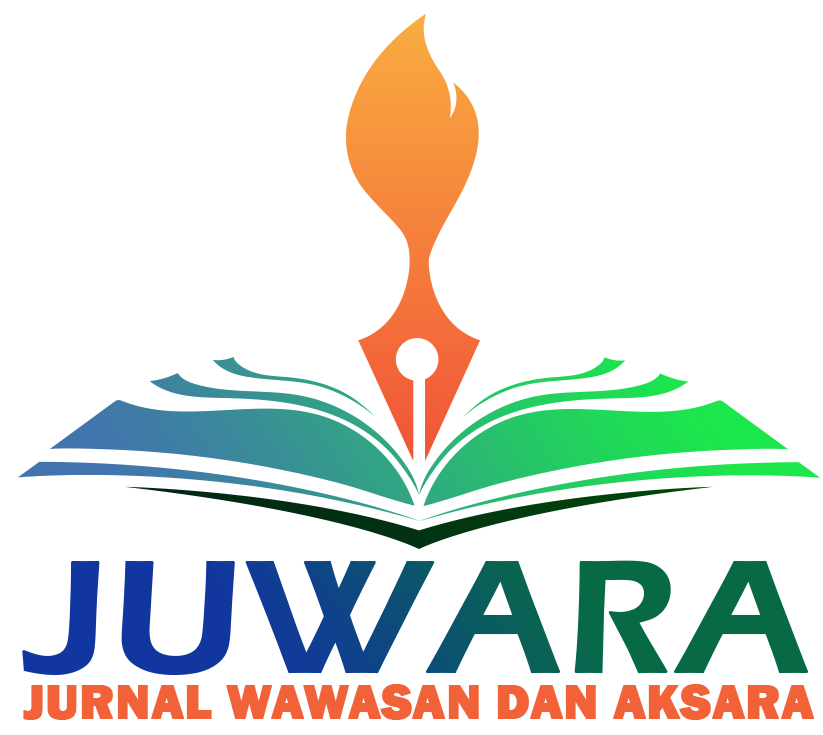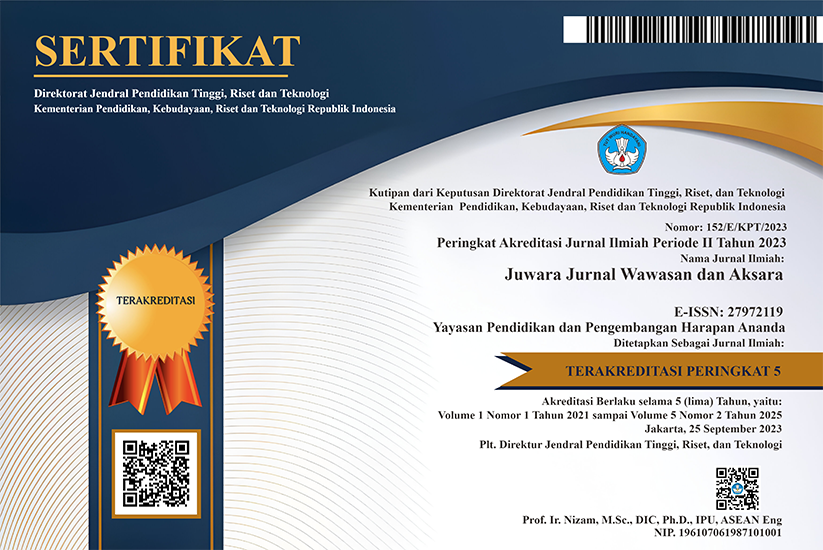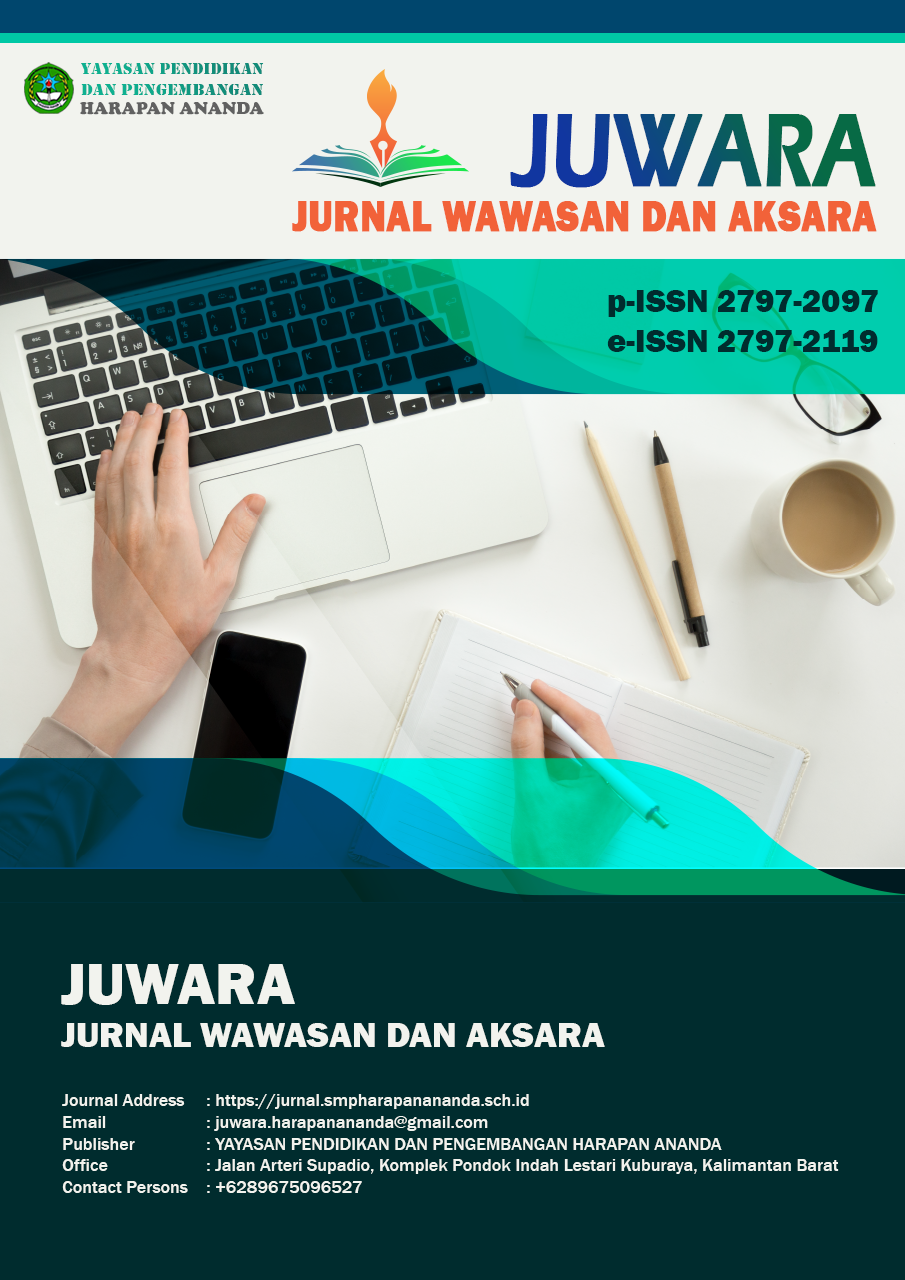Development of Social Studies Curriculum Integrating Local and Global Contexts for Character Strengthening
DOI:
https://doi.org/10.58740/juwara.v5i1.502Keywords:
character strengthening, curriculum, social studiesAbstract
This research aims to develop a social studies curriculum that is integrated with local and global contexts to strengthen the character of the nation in elementary school students. The development was carried out in response to the need for a curriculum that is able to bridge the gap between local wisdom values and global issues within the framework of the Independent Curriculum and the Pancasila Student Profile. This study uses the Research and Development (R&D) method with the Borg & Gall model approach which is modified into six main stages: preliminary study, curriculum design, expert validation, revision, limited trial, and final revision. Product validity was tested by five experts, practicality was assessed by teachers and students, and effectiveness was measured through a pre-test and post-test design of one group on 41 students. The results showed that the curriculum developed was very valid (88.6%), practical (positive response of 92% of teachers and 88% of students), and statistically effective (t = 10.42; p < 0.05) in improving students' social behavior. These findings suggest that a local-global integrated social studies curriculum can be an innovative approach to character-based contextual learning.
References
Anugrah, D. S., Supriadi, U., & Anwar, S. (2024). Multicultural Education: Literature Review of Multicultural-Based Teacher Education Curriculum Reform. The Eurasia Proceedings of Educational and Social Sciences, 39, 93–101.
Busey, C. L., Duncan, K. E., & Dowie-Chin, T. (2023). Critical What What? A Theoretical Systematic Review of 15 Years of Critical Race Theory Research in Social Studies Education, 2004–2019. Review of Educational Research, 93(3), 412–453. https://doi.org/10.3102/00346543221105551
Conoyer, S. J., Therrien, W. J., & White, K. K. (2022). Meta-Analysis of Validity and Review of Alternate Form Reliability and Slope for Curriculum-Based Measurement in Science and Social Studies. Assessment for Effective Intervention, 47(2), 101–111. https://doi.org/10.1177/1534508420978457
Curtis, M. D., & Green, A. L. (2021). A Systematic Review of Evidence-Based Practices for Students with Learning Disabilities in Social Studies Classrooms. The Social Studies, 112(3), 105–119. https://doi.org/10.1080/00377996.2020.1841715
Frank Angelo, P. A. (2023). Curriculum theory and practice: A comparative literature review. Ho Chi Minh City Open University Journal Of Science - Social Sciences, 13(2), 1–12. https://doi.org/10.46223/HCMCOUJS.soci.en.13.2.2793.2023
Haryanti, Y. D. (2023). The Urgency of Social Studies Learning through Strengthening Authentic Assessment for Teachers in Elementary School. Pegem Journal of Education and Instruction, 13(4). https://doi.org/10.47750/pegegog.13.04.17
Hwang, H., Cabell, S. Q., & Joyner, R. E. (2023). Does Cultivating Content Knowledge during Literacy Instruction Support Vocabulary and Comprehension in the Elementary School Years? A Systematic Review. Reading Psychology, 44(2), 145–174. https://doi.org/10.1080/02702711.2022.2141397
Jumriani, J., Mutiani, M., Putra, M. A. H., Syaharuddin, S., & Abbas, E. W. (2021). The Urgency of Local Wisdom Content in Social Studies Learning: Literature Review. The Innovation of Social Studies Journal, 2(2), 103. https://doi.org/10.20527/iis.v2i2.3076
Kartal, A. (2020). An Overview of Social Studies in Primary Education: A Meta Synthesis Study. Education and Science, 45(203), 123–151. https://doi.org/10.15390/EB.2020.8678
Kim, J. S., Relyea, J. E., Burkhauser, M. A., Scherer, E., & Rich, P. (2021). Improving Elementary Grade Students’ Science and Social Studies Vocabulary Knowledge Depth, Reading Comprehension, and Argumentative Writing: a Conceptual Replication. Educational Psychology Review, 33(4), 1935–1964. https://doi.org/10.1007/s10648-021-09609-6
Lee, M., & Harris, L. M. (2020). Teachers’ organization of world history in South Korea: Challenges and opportunities for curriculum and practice. The Journal of Social Studies Research, 44(4), 339–354. https://doi.org/10.1016/j.jssr.2020.05.002
Moch Fitran Naufaldy, Putri Khairunnisa, Sofian Putri Lumban Gaol, & Tin Rustini. (2024). Early Grade Social Studies Learning in the Independent Curriculum. INTERDISIPLIN: Journal of Qualitative and Quantitative Research, 1(5), 362–368. https://doi.org/10.61166/interdisiplin.v1i5.26
Moslimany, R., Otaibi, A., & Shaikh, F. (2024). Designing a holistic curriculum: Challenges and opportunities in islamic education. Journal on Islamic Studies, 1(1), 52–73. https://doi.org/10.35335/beztg009
Muzakkir, Hussin, Z., & Razak, R. A. (2024). Teachers’ beliefs towards character education curriculum in primary school: a systematic literature review. Education 3-13, 52(8), 1178–1192. https://doi.org/10.1080/03004279.2022.2142478
Natalia, V. E. D., Pratama, A. O., & Astuti, M. D. (2021). Implementation of Pancasila Values in Character Education: A Literature Review. International Journal Pedagogy of Social Studies, 6(1), 35–44. https://doi.org/10.17509/ijposs.v6i1.32569
Popp, J. S., Montgomery, J., Hoard, J., & Brock, C. (2021). Transforming social studies curriculum to integrate a social justice framework. Social Studies Research and Practice, 16(2), 158–171. https://doi.org/10.1108/SSRP-08-2020-0034
Shahjahan, R. A., Estera, A. L., Surla, K. L., & Edwards, K. T. (2022). “Decolonizing” Curriculum and Pedagogy: A Comparative Review Across Disciplines and Global Higher Education Contexts. Review of Educational Research, 92(1), 73–113. https://doi.org/10.3102/00346543211042423
Syamsiar, H., Lasmawan, I. W., & Sudiarta, I. G. P. (2023). Implementation of Independent Learning Curriculum in Social Studies Learning: Literature Review. Jurnal Ilmiah Profesi Pendidikan, 8(3), 1789–1796. https://doi.org/10.29303/jipp.v8i3.1376
Takumi, W., Hiroaki, S., Yu, O., & Ryosuke, O. (2021). Trends in Research on Teaching and Learning Spatial Cognition in Elementary Social Studies in Japan: A Systematic Review from 1989 to 2019. Geographical Review of Japan Series B, 94(2), 940201. https://doi.org/10.4157/geogrevjapanb.94.49
Umar, U., & Haryanto, H. (2023). Mapping Research Trends in Learning IPS of Elementary School: A Bibliometric Analysis. Proceedings Series on Social Sciences & Humanities, 12, 410–421. https://doi.org/10.30595/pssh.v12i.829
Wulandari, T., & Nawangsari, N. A. F. (2024). Project-Based Learning in the Merdeka Curriculum in Terms of Primary School Students’ Learning Outcomes. EDUKASIA: Jurnal Pendidikan Dan Pembelajaran, 5(2), 31–42. https://doi.org/10.62775/edukasia.v5i2.793
Zummi, N. Q. A., Supardi, Sukamto, Tomo, S. W., Sulistyosari, Y., & Indrahadi, D. (2020). Teaching Social Studies Education to Foster Civic Characters at the Secondary School in Indonesia: A Review ICoSSCE. https://doi.org/10.2991/assehr.k.200130.045
Downloads
Published
How to Cite
Issue
Section
License
Copyright (c) 2025 Sukarni, Marsini

This work is licensed under a Creative Commons Attribution-NonCommercial 4.0 International License.
JUWARA: Jurnal Wawasan dan Aksara provides open access to anyone so that the information and findings in these articles are useful for everyone. This journal's article content can be accessed and downloaded for free, following the creative commons license used.




















